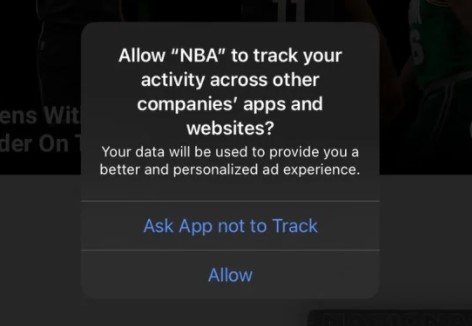
Apple’s Anti-Tracking Prompt Has Debuted “in the Wild”
- Apple has initiated the roll-out of the anti-tracking message for newly installed/opened apps on iOS 14.
- A few users are seeing the prompt popping up on their screens, asking them about what level of tracking they accept.
- Facebook called this move a profit-making act disguised in privacy’s fleece, warning about the effects on small businesses.
Several iOS 14.3 users are now reporting seeing a pop up that informs them about trackers deployed on specific sites they visit or apps they use and asks them to decide to allow the persistence of the tracking or to ask not to be tracked.
This is a new feature that is part of Apple’s commitment to ramp up user privacy in iOS 14, and the very element that has had Facebook panicking about since its announcement. For advertising companies, tracking users, and collecting data about their interests is key, and this constitutes a big portion of Facebook’s business.
The new privacy feature's roll-out is not universal yet, but it is expected to be completed in the first months of 2021. Until then, iOS 14 and iPadOS 14 users will be prompted to answer what privacy settings they prefer and to revoke or grant the associated permissions. This pop-up will appear when a newly installed app is opened for the first time or after an update that has affected the relevant policies.
Apple actually planned to make this feature available from the first day of the iOS 14 release, but the remissness of the app developers and their advertising partners has forced the tech giant to postpone its introduction for later. The first users who noticed the appearance of the new message are using iOS 14.4 beta 1, which was recently seeded to registered developers, so this may not be widely available yet. However, others report running iOS 14.3, so the roll-out appears to be fragmented.
Facebook has recently pleaded for a reconsideration of this system, putting small businesses at the front, warning that Apple’s move will hurt them at the worst possible time, as the pandemic has had catastrophic effects already. In a newspaper ad, the social media platform explains that Apple is doing this for profit and not the user’s privacy. The way Facebook sees it, small developers will have to turn to in-app purchases and user subscriptions to survive, paying Apple its 30% cut.
Apple responded to this attack with the following statement:
From our point of view, both companies have valid arguments, and one can say that they’re both right in a sense. In the end, what matters is user privacy, and even if that’s a side-effect of Apple maximizing its profits, it’s still very much welcome.






